 Article
Article
October 1, 2025
Message from the TIS National Coordinator, Prof Tom Calma AO
Earlier last month we gathered on Gadigal Country for the 2025 National Tackling Indigenous Smoking (TIS) CEO Workshop. I was honoured to open the day with a challenge to all leaders in the room: evaluate our collective achievements and prepare with determination for the 2027–31 funding bid.
The TIS program exists for one purpose, to save lives. We have seen strong progress since the program began in 2010, but the challenge before us remains significant. Smoking continues to cause one third of all Aboriginal and Torres Strait Islander deaths at any age, with more than 10,000 lives lost in the past decade alone. At the same time, our communities have shown remarkable resilience and leadership, with almost 50,000 fewer daily smokers and more than 23,000 lives saved over recent years.
I encouraged CEOs and coordinators to remain focused on innovation, wise investment and timely reporting. Our shared success relies on everyone’s commitment to evaluation, strong partnerships and community driven strategies.
The days program brought together a wealth of knowledge and experience. Among the standout sessions was the exceptional presentation by Kerindy Clarke, who introduced the National TIS Workforce Development Framework. Her leadership underscored the strength and growth of our workforce, and the central role of our people in sustaining long-term impact while highlighting the areas organisations can step up to support these staff.
We also witnessed the creative and engaging facilitation of social media 1-0-1 by Penney, on behalf of Claudine Thornton. This interactive session on content planning gave participants tools to strengthen their digital presence, making sure that our voices continue to be visible and strong in online spaces.
Panels and presentations across the day, from CIRCA’s evaluation insights to Dr Raglan Maddox’s reflections on truth, power and prevention, reminded us that evidence and community priorities must remain at the heart of our work.
As we prepare for the next funding round, I call on all TIS leaders to critically review your operations, support your coordinators and maintain the drive that has brought us this far. Together, we can continue to lead efforts that empower communities to build a healthier future.
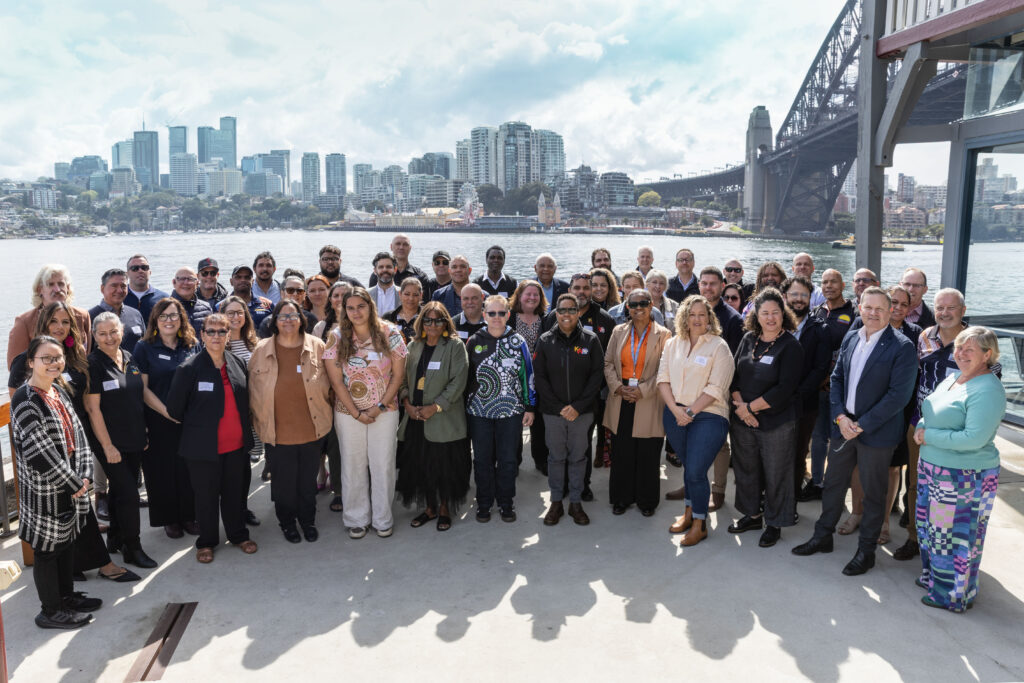
At the end of July, I had the privilege of delivering the 4th Deakin University Indigenous Oration at Federation Square in Melbourne. My address, titled “After the Voice loss and election landslide: how has the landscape changed and what’s on the horizon?”, reflected on the shifting political and social climate since the referendum and what this means for Aboriginal and Torres Strait Islander peoples.
I highlighted how, despite the challenges of the referendum outcome and the persistence of negative rhetoric, there is great strength and resilience in our communities. The landslide election result has brought new opportunities, including a record number of women in Parliament and the advancement of progressive legislation that has the potential to reshape justice, health and education outcomes. I also spoke of the importance of justice reinvestment, new employment initiatives and the growing excellence of Indigenous leadership, showcasing female achievements across fields such as STEM and health.
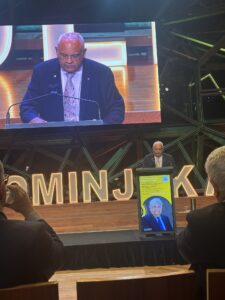
Source: Deakin University – Nikeri Institute
August has shone a light on the complex challenges Australia continues to face around tobacco and vaping. Across the country, retailers have reported steep declines in legal tobacco sales, with much of this trade shifting into a black market now estimated to be worth around $10 billion each year. This illicit industry is not only depriving governments of vital health funding, it is also fuelling organised crime. In Queensland, so-called “Tobacco Wars” have seen gangs and syndicates competing violently for control, while police operations have seized millions of illegal cigarettes and thousands of vapes in major busts. These actions demonstrate both the scale of the problem and the determination of authorities to curb the harm caused by the illegal trade.
Public health experts are also raising alarms about what is being inhaled in unregulated vapes. Alongside high doses of nicotine, testing has uncovered chemicals, heavy metals and even synthetic opioids far more powerful than morphine. These findings underscore the risks for young people in particular, who are being targeted by cheap, flavoured products outside of regulatory safeguards. Governments are responding with new measures, New South Wales, for example, has committed funding to expand inspections, strengthen licensing for retailers and support cessation tools like the Pave app. From October, all tobacco retailers and wholesalers in NSW will need to be licensed. Taken together, these developments remind us that community wellbeing relies on more than enforcement; it also depends on creating supportive environments where healthier choices are accessible, culturally safe and sustained over time. You may recall seeing this slide in Raglan’s presentation in Darwin and you might want to use in your community presentations as we all have a role to play to stop this illicit practice.
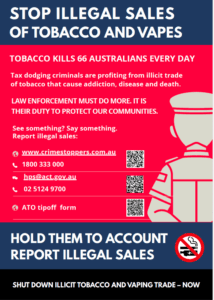
September highlights also included the display of the Kilung Morunbul Jum statue at the SWELL festival of art where it was awarded the SWELL SCULPTURE INDIGENOUS ARTIST AWARD Supported by Kombumerri Aboriginal Corporation for Culture
Did you see that a second spear has been included to identify that smoking also damages the heart.
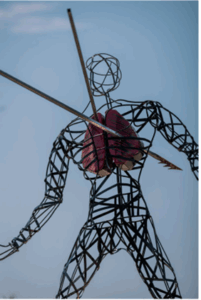
Left Ear Experiment (Shannon Best, Frederick Beel & Allen Lucini) – Kilung Morunbul Jum
The other major event was the Public Health Association of Australia (PHAA) conference in Wollongong NSW. NBPU had a stall that was very popular with a lot of conversations and merch distribution. Smoking and Vaping was a consistent theme across the three days and The Hon Rebecca White MP, Assistant Minister for Health and Aged Care, Assistant Minister for Indigenous Health and Assistant Minister for Women also mentioned the success of TIS in her video speech. I participated on a panel titled “Indigenous Voices in shaping our future” where among other issues I highlighted the success of TIS and that community empowerment, self determination and support of community driven initiatives was the key to TIS’s success.
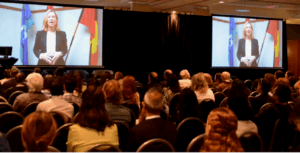 With Christmas and the New Year just months away include in your presentations that stopping smoking and vaping will mean more money to share and enjoy with family and friends.
With Christmas and the New Year just months away include in your presentations that stopping smoking and vaping will mean more money to share and enjoy with family and friends.
Professor Tom Calma AO
National Coordinator Tackling Indigenous Smoking
